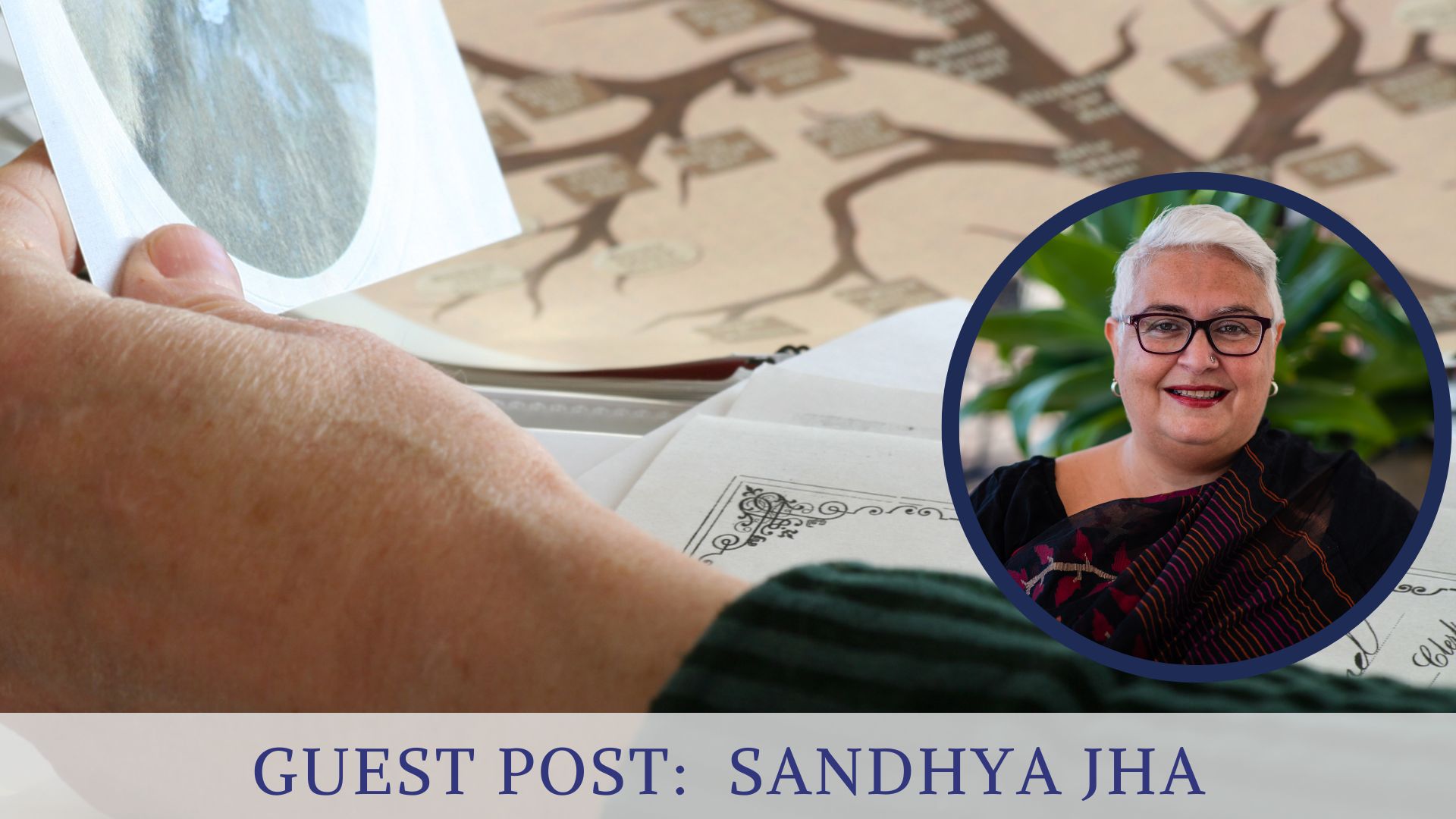Today, we welcome Sandhya Jha (they/them), to help us in calling on our ancestors. Sandyha is a community organizer, anti-oppression consultant, and ordained minister in the Christian Church (Disciples of Christ). They helped First Christian Church of Oakland convert their massive building into a collective for nonprofits called the Oakland Peace Center. Sandhya’s newest book Rebels, Despots, and Saints is their fifth book with Chalice Press.
Rebels, Despots, and Saints
My new book, Rebels, Despots, and Saints, is built on two hopes. First I want to empower you to connect with your ancestors. And closely related, I want to equip you to become the ancestors that our descendants need.
Almost 20 years ago I went to my first PANAAWTM (Pacific Asian and North American Asian Women in Theology and Ministry) conference, a gathering of Asian and Pacific Islander women who were professors of religion or clergy or activists of faith.
In the opening worship, theologian Rita Nakashima Brock, invited all of us to introduce ourselves by saying:
“I am ___________,
daughter of ____________,
whose mother was __________,
whose mother was ___________.”
I remember feeling a little ashamed that I could only go back two generations instead of four. And I worried a little that I was a bad Asian daughter.
Then I realized most of us in the room were apologizing for facing the same problem.
Brock went on to play a critical role in my ministry as one of the most forward thinking theologians in my denomination; and yet even her most visionary theological work was grounded in the wisdom of theological ancestors as well as contemporary liberation, feminist and womanist theologians. I learned from her and many others to identify and embrace my ancestors. Now I am striving to become the kind of ancestor that future generations need.
I wrote Rebels, Despots, and Saints: The Ancestors Who Free Us and the Ancestors We Need to Free to tell this story. And I am inviting readers like you into that story also.
Calling on Ancestors
Although I did not know much about my own ancestors, I began noticing that some activists and justice movement leaders took time in the middle of street actions to call on their ancestors. When they did, it nearly always changed the atmosphere and energy of the gathering.
I have been working for justice in the city of Oakland for over 15 years. And for most of that time, I have been committed to showing up in solidarity with justice movements in my city.
Remembering with Ritual
When justice leaders call on ancestors at a vigil, a rally, a funeral, even a fundraising event, they use many kinds of ritual. Some leaders begin with the invocation of ancestors. Sometimes someone pours libations. And other times the rituals include drumming, or calling the names of people who came before in a somber ritual. Sometimes it is simply stating the shoulders on which we stand, the movement leaders who came before.
When people invite each other to remember ancestors, I’ve noticed something. Not only does the energy shift, the leaders who call on their ancestors regularly also show up more grounded. They are the ones less prone to burnout and more able to engage the movement as a long game. The ancestors seem to help them resist living and dying by every campaign win or loss.
The ancestors seem to help them resist living and dying by every campaign win or loss.
I’ve witnessed these rituals that honor ancestors in gatherings of racial justice, queer liberation, disability justice, immigration solidarity, and especially Land Back or Indigenous land rematriation movements.
Experiencing the power of the ancestor rituals set me on a path of discovery. It was a continuation of the journey I began 20 years ago at my first PANAAWTM conference. I found my own ancestral path is a beautiful and tangled one. The path led me to write Rebels, Despots, and Saints.
A Love Letter
 I embarked on this project of discovery and writing in 2019 for two reasons.
I embarked on this project of discovery and writing in 2019 for two reasons.
First, it is my love letter to organizers, who are in such a high burnout field and who deserve sources of support to keep them/us in the work in life-giving ways.
Secondly, it is also my letter of invitation to anyone in my community of spiritual folks who’s not already part of the social justice movement, and wants to be, yet who feels a little (understandably) afraid. I think ancestors can give us encouragement, and I think they can also give us a deeper sense of our own power.
You might be able to tell that with that starting place, I had kind of a naive notion that the vast majority of us have ancestors from hardscrabble origins, more oppressed than oppressor, and that connecting with them would automatically be enriching and inspiring. But it turns out our ancestors were human, which means they were, and sometimes are, complicated.
It turns out our ancestors were human, which means they were, and sometimes are, complicated.
Our ancestors can be atrocious or inspiring, oppressor or oppressed. This is true for both people of color and white people.
So I’ve ended up wrestling with just how messy our ancestors are. And I’ve also considered how broadly we can cast the net of ancestors to include non-biological ancestors from social movements, from our faith traditions and our cultural background, from the lands we inhabit, and causes to which we are committed.
A simple exercise
In fact, one of my favorite, VERY simple exercises around this is a meditation practice that Cisa Payuyo invited us to practice when she and I led a group discussion on ancestors for a racial justice project, Living Justice, in which we were both participants. The practice has three steps and can take as long or as short an amount of time as you want to invest.
Picture an ancestor who did harm; tell them “Here’s how you screwed up; here’s how I’m working to fix it.”
Picture an ancestor who fought for justice or resisted oppression; thank them and let them know what you’re doing to carry on their legacy.
Then picture an ancestor who has experienced harm. Extend love to them and let them know what you’re doing to create a world where people will not have to experience that kind of harm again.
When we engage this work of connecting with our ancestors, the saints, the rebels, and the despots, we enter the process of becoming the ancestors our descendents need.
And that is true whether we know the name of our great-great grandmother or not. In fact, I am Sandhya Jha, child of Arvind Kejriwal, grandchild of Donald Caskie, great-grandchild of Saints Baya and Maura. None of those are biological ancestors, but they are ancestors whose legacy I hope to carry with me for many years to come.
I hope you might also find the courage to take a path of discovering your ancestors, your great cloud of witnesses, powerful ancestors, who support you in your work of transforming the world.
FEBRUARY GIVEAWAY
We are delighted to share this wisdom from Sandhya Jha, and grateful for how their book will inform and inspire our #pastoralimagination. We will be giving away ONE copy of Rebels, Despots, and Saints: The Ancestors Who Free Us and the Ancestors We Need to Free.
How to enter this giveaway? Simply sign up for our 3MMM email. At the end of the month, we will select one person from our email list to receive a copy of the book.




